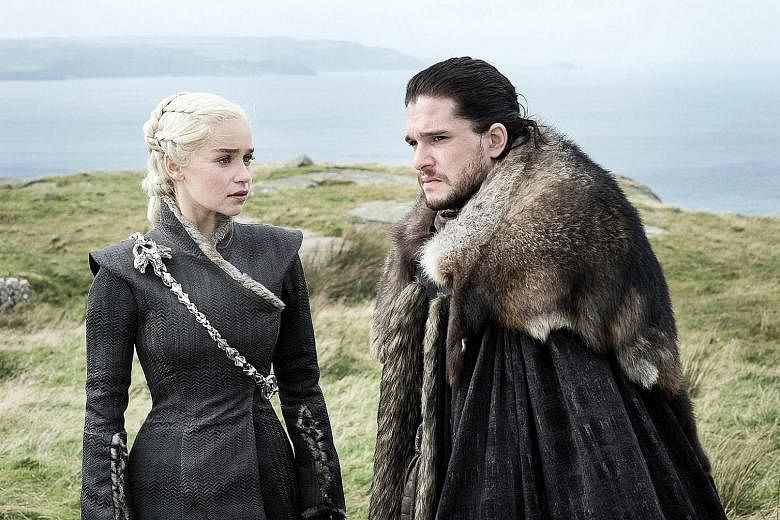WASHINGTON • Winter has finally come for Game Of Thrones, whose latest season finale, which aired on Sunday, left the land of Westeros in as deep a crisis as it has seen in thousands of years.
But with the HBO fantasy series now on hiatus until at least the end of next year, some viewers say they are taking a break from HBO entirely - highlighting a challenge facing many entertainment companies in an era of constant stimulation and on-demand digital services.
Ms Colleen Morrison, a Game Of Thrones fan in New Jersey, signed up for HBO's online streaming app in June.
Now, she says, it is going to be an easy decision to cancel her subscription this week after she re-watches the season finale a second time.
"I didn't mind paying US$15 (S$20) each month because it's the kind of show where I wanted an immediate viewing to avoid spoilers, but I'm also not interested in keeping the service since I'm not invested in anything else," she said.
She is part of a small but savvy crowd of consumers who know exactly what they want out of their TV experience.
Cost-conscious and empowered by the Internet's convenience-at- a-click mentality, these consumers take advantage of free trials, no-contract commitments and the media industry's own struggle in the face of technological change to help guard their wallets.
Ignoring the barrage of in-house teasers and promotions for other related content, these viewers resist the siren song of TV networks which, more than ever, are being forced to battle one another for attention dominance.
An abundance of high-quality television shows from Netflix, Hulu and old-school cable programmers such as AMC, HBO and Showtime are helping some consumers become more discerning in their tastes - and less loyal.
Abandoning one series or channel for another has never been more convenient or less risky, particularly when many cable channels offer streaming apps directly to the public instead of through cable companies or other traditional television providers.
"In a world where you can turn anything on and off whenever you want, you're always fighting for my wallet," said Mr Rich Greenfield, a media analyst at BTIG.
"I can cancel Hulu or Sling TV or HBO or DirecTV Now - any of these things have become 'point at a button and click'."
The significance of this convenience is enormous.
On traditional cable, television programmers can easily retain customers because of the channel bundle. To extricate themselves from a single channel, consumers must often weigh the risks of losing many other channels and potentially breaking off a contract with their cable company.
Even if it is a small, premium tier they are looking to shed, customers still have to brace themselves for a time-intensive phone call with their cable provider, which many find off-putting.
"If I had to go through the whole process of adding cable to my Comcast package just to watch HBO or any other channel, I would not have done it," said Ms Morrison.
"I know that's why my parents waited so long to cancel their package - it just took too much effort."
Because cancelling something online can be so easy, you tend to see higher cancellation rates across the streaming TV industry, said Mr Glenn Hower, a senior analyst at market research firm Parks Associates.
Although just 1 per cent of cancellations are by viewers discontinuing a free trial, many people appear to be spending a matter of months on a streaming service before switching.
"The churn numbers tend to be pretty high, indicating there are a substantial number of consumers subscribing to a service for a short time and then bailing out," said Mr Hower.
Studies by Parks Associates have found that, on average, streaming services manage to hang on to customers for little more than a year.
Netflix enjoys more staying power than most, retaining customers for an average length of 21/2 years, according to Mr Hower.
Part of the secret to Netflix's success has been a relentless string of television hits, as well as its use of data to design shows that are highly tailored to specific audiences.
There is some evidence that other TV producers are also following this strategy; even as Game Of Thrones was wrapping its season finale, HBO made sure viewers got a taste of its upcoming drama, The Deuce, which does not debut until Sept 10.
HBO spokesman Quentin Schaffer said: "Your promos help remind people so that at the end of the month they feel, 'You know what, I guess we did watch stuff on the network this month.'"
The company has not noticed any immediate uptick in cancellations since the season finale of Thrones, but it will be at least a month or two before any cancellations show up in the numbers.
HBO does not make a habit of disclosing cancellation figures, though.
The idea, in other words, is to hook people into becoming year- long addicts - which is far easier said than done, particularly when there is so much other Internet content to consume, let alone other TV shows.
"Churn is the killer of all these direct-to-consumer services," said Mr Greenfield.
"Showtime has the same problem. CBS All Access. All of these services have the same problem."
WASHINGTON POST

